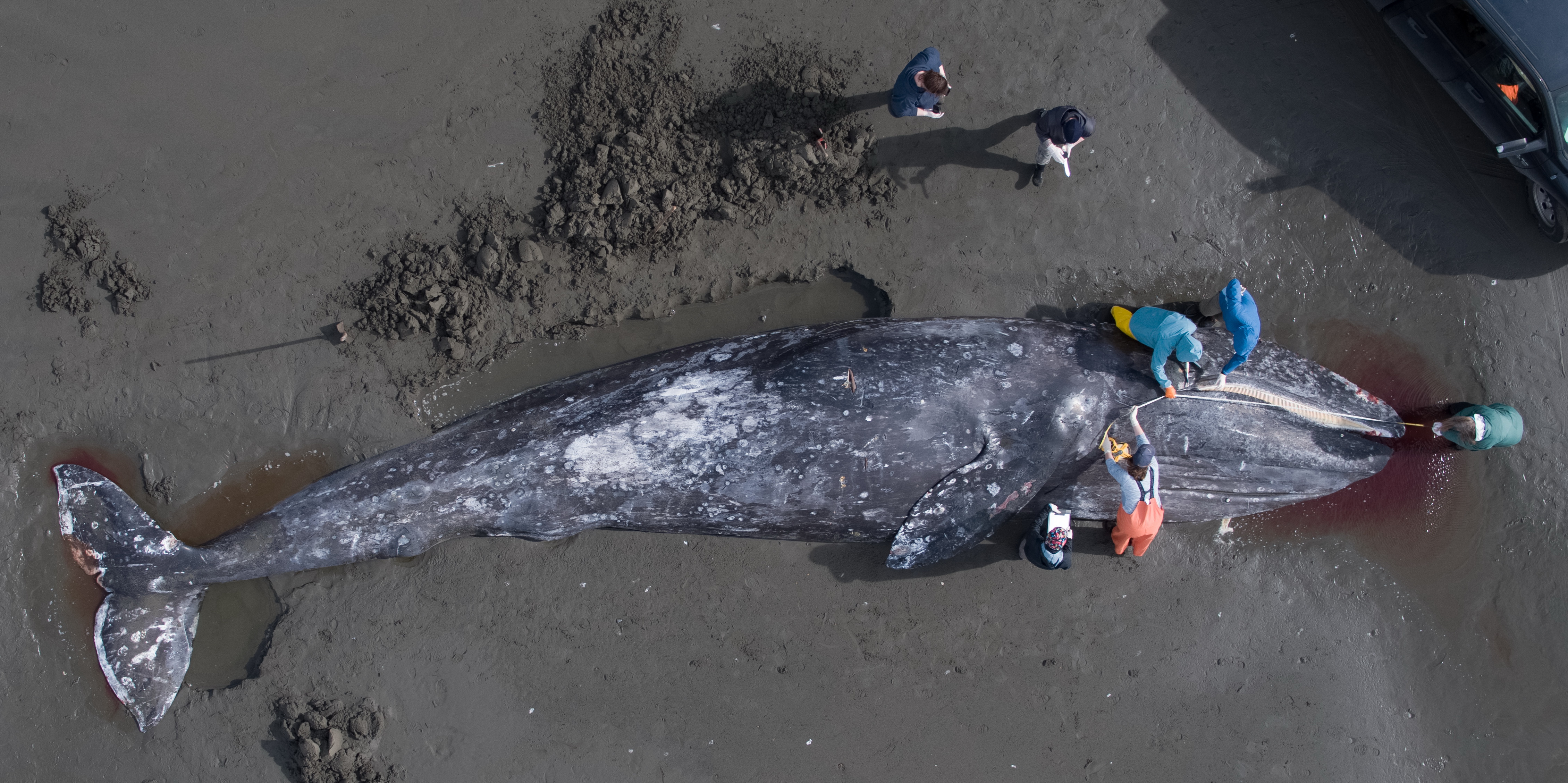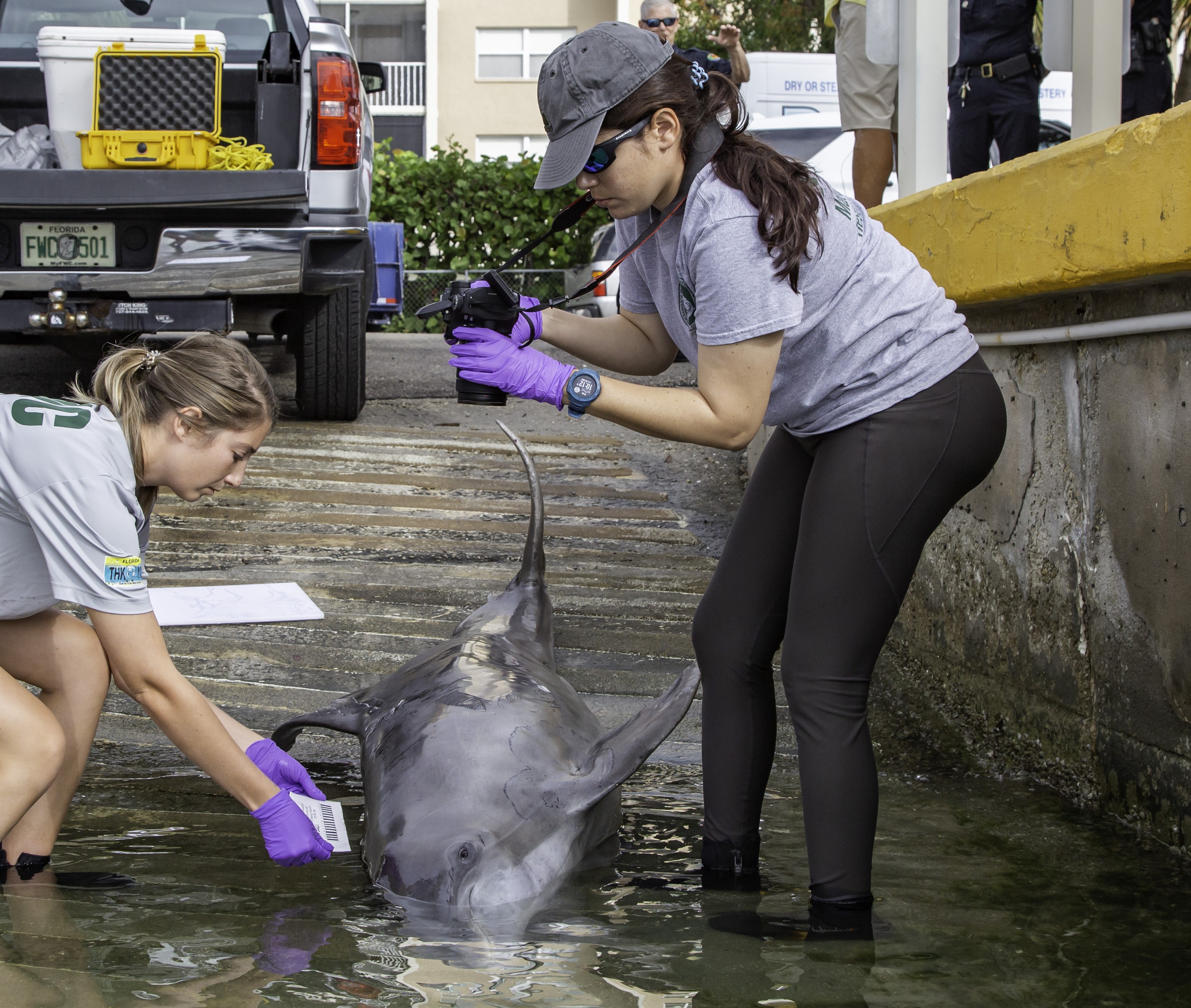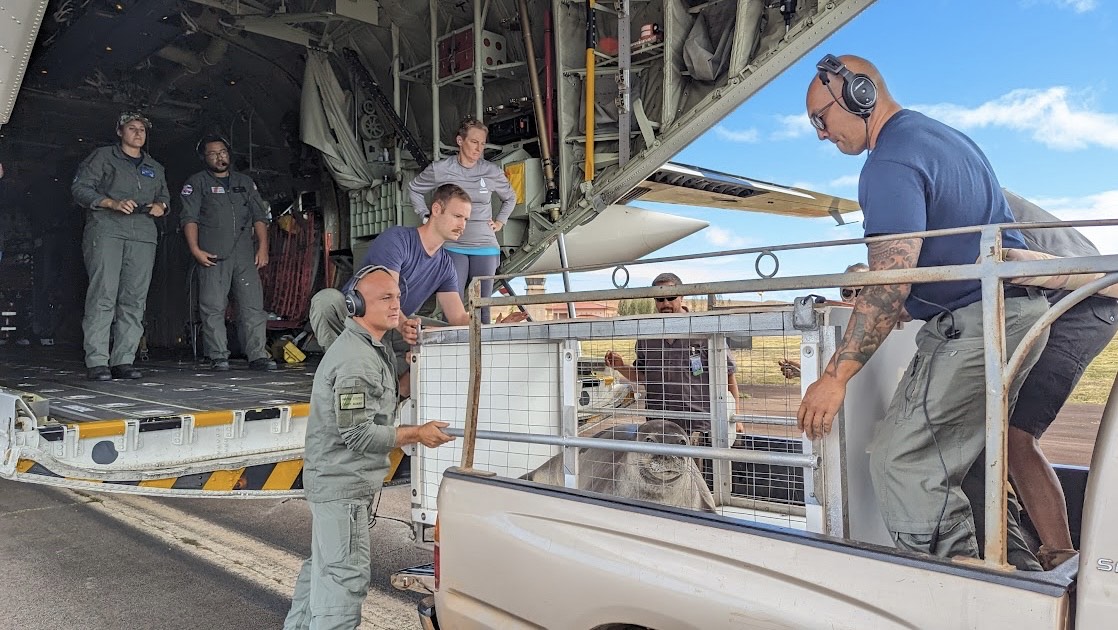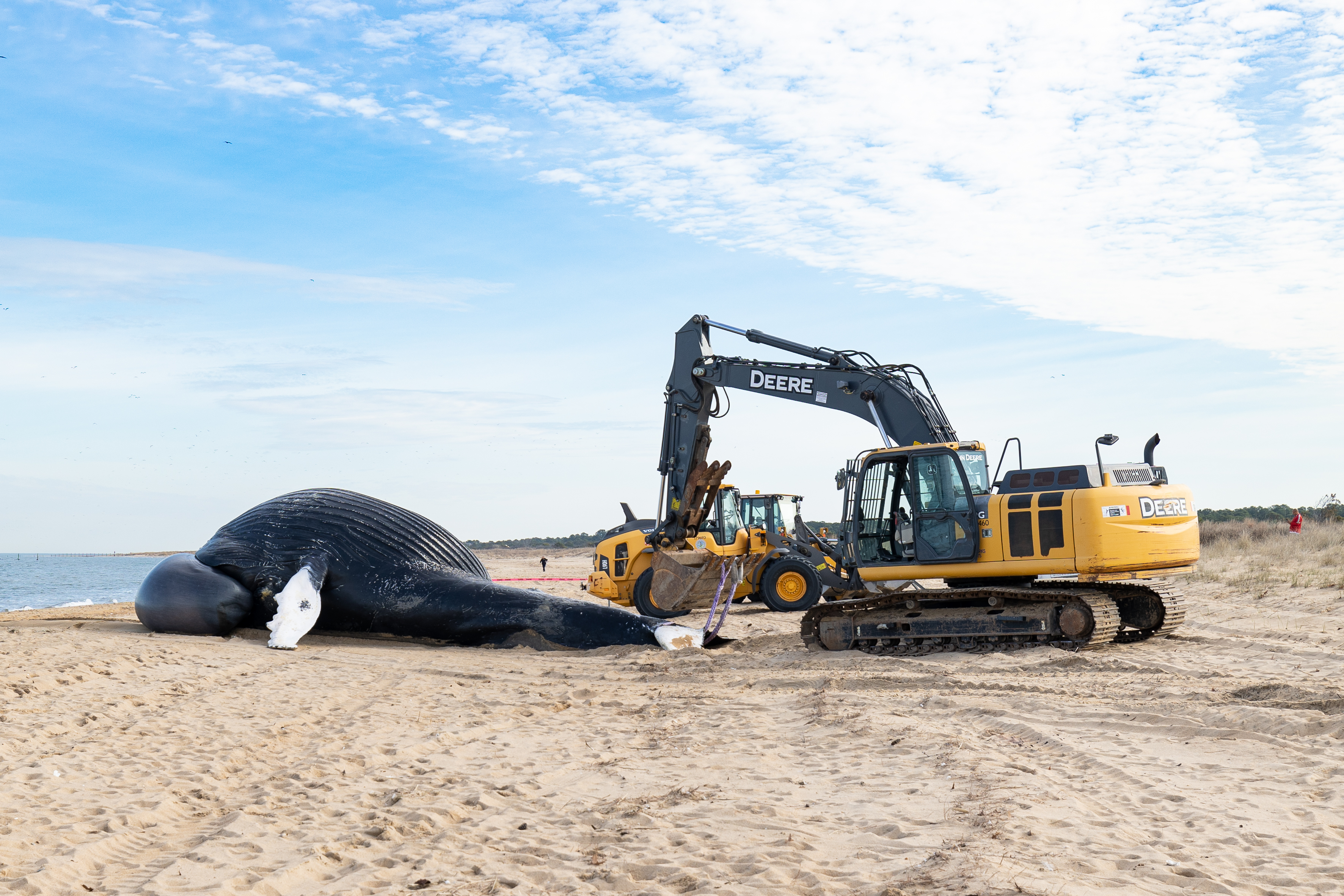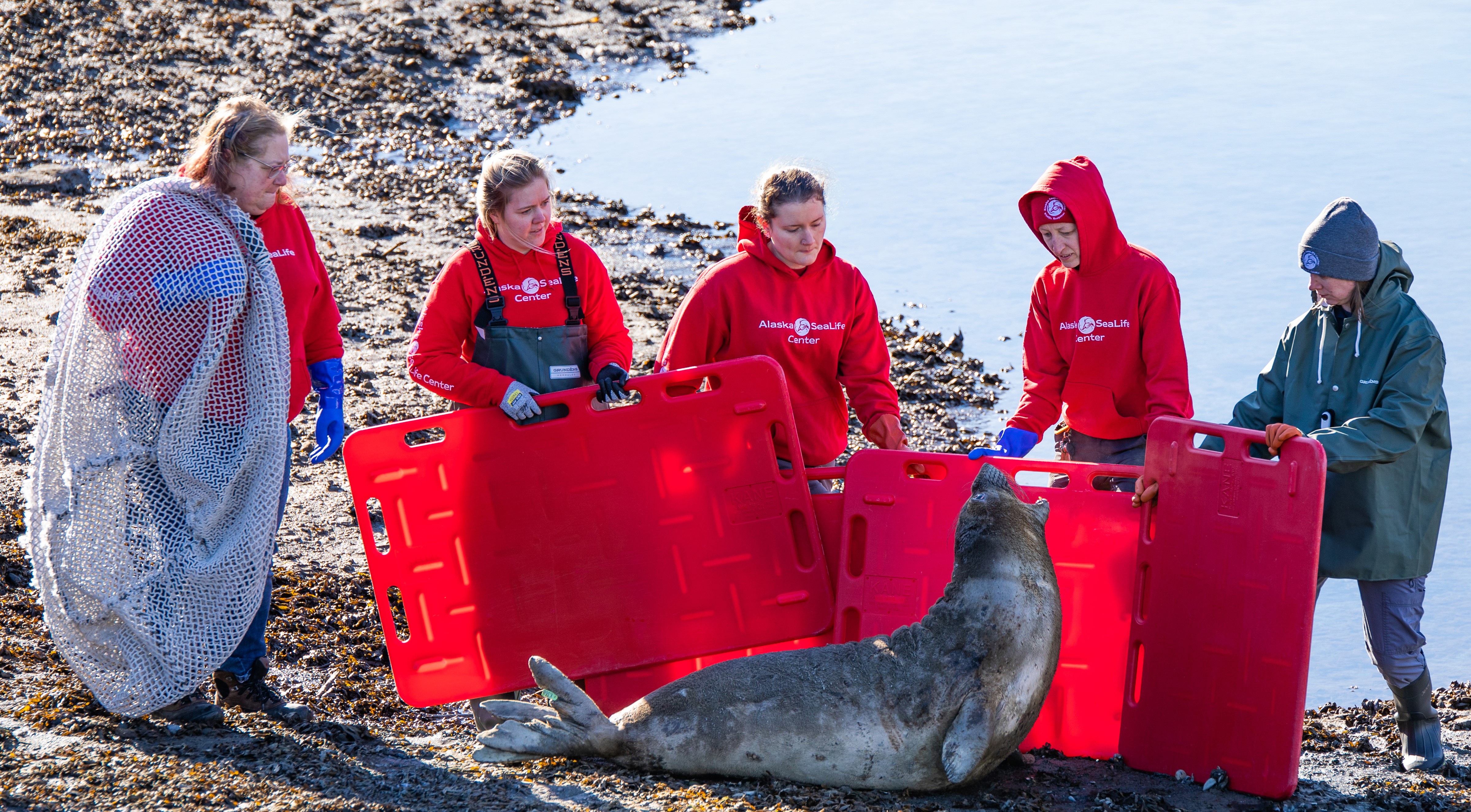National Marine Mammal Stranding Response Network
The U.S. Marine Mammal Stranding Response Network responds to live stranded, sick, injured, out of habitat, or entangled marine mammals, and investigates dead stranded marine mammals.
Marine mammals are important indicators of ocean, climate, and human health. They tell us a great deal about environmental changes, especially those caused by humans. NOAA Fisheries’ Marine Mammal Health and Stranding Response Program authorizes and oversees the U.S. Marine Mammal Stranding Response Network. There are more than 120 partner organizations in the Network, including:
- Non-profits
- Zoos and aquaria
- Academic institutions
- Government agencies (federal, tribal, state, and local)
- Museums
These organizations are composed of trained and experienced responders and veterinarians. They are authorized under the Marine Mammal Protection Act to respond to—and in some cases rehabilitate—stranded marine mammals. Most organizations are authorized to conduct this important work through stranding agreements issued by NOAA Fisheries. Some individuals are authorized through their capacity as federal, tribal, state, or local government employees.
NOAA Fisheries is responsible for conserving and recovering all cetaceans (whales, dolphins, and porpoises) and pinnipeds (seals, fur seals, sea lions).
What is a Stranding?
A “stranding” occurs when a marine mammal is:
- Dead, whether found on the beach or floating in the water
- Alive on a beach but unable to return to the water
- Alive on a beach and in need of apparent medical attention
- Alive, in the water, and unable to return to its natural habitat without assistance
Not all pinnipeds on the beach are stranded. Seals, fur seals, and sea lions spend time on the beach to rest, molt, and breed.
Marine mammals strand for a variety of reasons. Results from examinations and necropsies (animal autopsies) show common causes of strandings, include:
- Infectious diseases due to parasites, bacteria, fungi, and viruses
- Non-infectious diseases, including cancer
- Harmful algal blooms and associated biotoxins
- Injuries due to vessel collisions, entanglement in active and derelict fishing gear and marine debris, ingestion of marine debris, or other human interactions, such as gunshots
- Malnutrition
- Pollution exposure
- Separation of pups or calves from their mothers
- Human disturbance or harassment
- A combination of these or other factors
Some strandings may also be related to unusual weather or oceanographic events such as hurricanes and tropical storms or marine heatwaves. In many cases, the causes of a stranding event remain undetermined, especially when carcasses are found in advanced states of decomposition and examinations are limited.
Objectives of the Stranding Network
The overarching goals of the U.S. Marine Mammal Stranding Response Network are to:
- Monitor, track, and investigate causes of marine mammal illness, injury, and death, as well as health trends over time, including the impacts of climate change
- Collect data from stranded marine mammals as a resource for scientific information, management decisions, and/or law enforcement investigations
- Minimize risks to public health and safety from stranded marine mammals (such as bites, disease transmission, etc.)
- Provide for the welfare of live stranded or otherwise distressed marine mammals in some cases
- Advance public education and engagement in ocean conservation
- Enhance the conservation and management of wild marine mammal populations and the wider marine ecosystem
The Stranding Network strives to return live stranded and rehabilitated animals to the wild when it is safe to do so for the individual animal and the wild populations. In some cases, such as when injuries are severe or the overall prognosis is poor, euthanasia is the most humane course of action. Some animals, such as those with chronic medical conditions that require long-term care, may be deemed non-releasable. Non-releasable animals are placed in permanent managed care to serve as ambassadors for their species.
Marine Mammal Strandings
Every marine mammal stranding event is unique and poses different challenges. The information we learn helps us understand ocean health and how marine mammals are responding to threats. Responses to abundant marine mammal species, such as California sea lions or bottlenose dolphins, provide for animal welfare and collect important data. These responses also keep the Stranding Network organizations trained and prepared for emergency events involving endangered and threatened species. In those cases, each individual animal can be critical to the overall population. Live animals that are rescued and rehabilitated provide additional valuable information on the biology, physiology, and health of those and related species. Necropsies provide valuable insight into causes of death, age and reproductive status, disease and contaminant exposure, physiology, and population health of species not readily observed in the wild.
The proper disposal of marine mammal carcasses is also an important aspect of marine mammal stranding response. Disposal methods vary based on the stranding. Stranding Network organizations consider several factors such as the number and size of the animal(s), carcass condition, stranding location, amount of drugs administered to the animal, and logistics. They determine the most appropriate disposal method for each carcass and follow all laws, regulations, and guidelines.
Safety First
All stranding responses prioritize human safety to ensure the Stranding Network members and the public avoid injuries. Environmental conditions may become worse during the course of a response. A response may not always be considered safe and/or practical (e.g., animals rolling in the surf, scavenging, tides, light, etc.). Stranded marine mammals are large, wild, unpredictable, and may have diseases that are transmissible to people. For these reasons—as well as legal requirements—only trained and authorized responders should approach or pick up a stranded marine mammal. Over the past several decades, the Marine Mammal Health and Stranding Response Program has worked with the Stranding Network to develop and update best practices to follow in the field. They are based on lessons learned and evolving animal care techniques.
Animal Welfare
Stranded marine mammals are often sick or injured. The Stranding Network uses best practices, combined with nationally approved veterinary methods, to provide compassionate care and treatment to reduce pain and suffering when possible. These actions are conducted respectfully and, in some cases, can increase the likelihood of an animal surviving.
Importance to Conservation
The Stranding Network provides data that are foundational to our science and management efforts for mitigating human interactions. This information is particularly important in our efforts to reduce bycatch in commercial fisheries or collisions with commercial or recreational vessels. These data are entered into the National Marine Mammal Stranding Database. This allows comparison of the causes of illness and death of stranded marine mammals with physical, chemical, and biological environmental parameters.
Data on marine mammal strandings directly informs our List of Fisheries and take reduction plans and teams. It justifies and provides evidence for agency policies and regulations, such as measures implemented to reduce vessel strikes (e.g., shipping lane changes, speed restrictions, implementation of Areas to be Avoided) as well as time-area closures and gear modifications. Marine mammal health data also inform marine mammal mortality and serious injury reports and stock assessments, which help us balance marine mammal conservation and fisheries management.
We also use marine mammal health data to:
- Investigate violations of environmental laws pertinent to marine mammals
- Monitor disease outbreaks or harmful algal blooms impacting marine mammals
- Determine when marine mammal Unusual Mortality Events are occurring and conduct effective investigations
- Monitor climate impacts on ecosystems
Funding for Stranding Responses
We fund a portion of eligible members of the U.S. Marine Mammal Stranding Response Network through the competitive Prescott Grant Program. Prescott grants help recipients:
- Respond and treat (i.e., rehabilitate) marine mammals
- Collect data from living or dead marine mammals for scientific research
- Improve facility operations dedicated to these purposes
Prescott Grants provide valuable support for Network members, but do not fully cover the cost of stranding network activities. They are not the sole source of funding for the organizations. Many stranding organizations are supported by their local communities and volunteers.
What Can You Do?
We need your help. The Marine Mammal Health and Stranding Response Program relies on reports of stranded marine mammals by the public to save animals in distress and understand causes of injuries and mortalities.
If you see a stranded marine mammal, do not attempt to touch or handle the animal. Immediately report it to your regional 24/7 hotline, which will connect you to your local stranding network organization:
- Alaska: (877) 925-7773
- Greater Atlantic: (866) 755-6622
- Pacific Islands: (888) 256-9840
- Southeast: (877) 942-5343
- West Coast: (866) 767-6114
When reporting a stranded marine mammal, include the following information:
- Date and time
- Location of stranding (including latitude and longitude, if known)
- Number of animals
- Condition of the animal (alive or dead)
- Species (if known)
Photos or video from different angles and from a safe and legal distance (note that regulations apply to certain species and areas) can provide valuable information to Stranding Network responders. While we make every effort to respond to each stranded marine mammal, sometimes it is not possible (e.g., when human safety would be compromised).
Regional Programs
International Programs
More Information
More Information
- 2020 and 2021 Combined Report of Marine Mammal Strandings in the United States
- 2019 Report of Marine Mammal Strandings in the United States: National Overview
- 2018 Report of Marine Mammal Strandings in the United States: National Overview
- 2017 National Report of Marine Mammal Strandings in the United States
- Working Group on Marine Mammal Unusual Mortality Events
